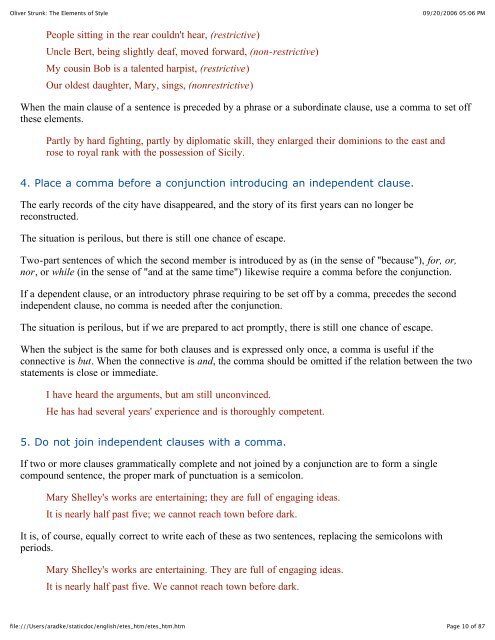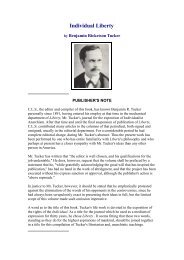Oliver Strunk: The Elements of Style - Evernote
Oliver Strunk: The Elements of Style - Evernote
Oliver Strunk: The Elements of Style - Evernote
You also want an ePaper? Increase the reach of your titles
YUMPU automatically turns print PDFs into web optimized ePapers that Google loves.
<strong>Oliver</strong> <strong>Strunk</strong>: <strong>The</strong> <strong>Elements</strong> <strong>of</strong> <strong>Style</strong><br />
People sitting in the rear couldn't hear, (restrictive)<br />
Uncle Bert, being slightly deaf, moved forward, (non-restrictive)<br />
My cousin Bob is a talented harpist, (restrictive)<br />
Our oldest daughter, Mary, sings, (nonrestrictive)<br />
file:///Users/aradke/staticdoc/english/etes_htm/etes_htm.htm<br />
09/20/2006 05:06 PM<br />
When the main clause <strong>of</strong> a sentence is preceded by a phrase or a subordinate clause, use a comma to set <strong>of</strong>f<br />
these elements.<br />
Partly by hard fighting, partly by diplomatic skill, they enlarged their dominions to the east and<br />
rose to royal rank with the possession <strong>of</strong> Sicily.<br />
4. Place a comma before a conjunction introducing an independent clause.<br />
<strong>The</strong> early records <strong>of</strong> the city have disappeared, and the story <strong>of</strong> its first years can no longer be<br />
reconstructed.<br />
<strong>The</strong> situation is perilous, but there is still one chance <strong>of</strong> escape.<br />
Two-part sentences <strong>of</strong> which the second member is introduced by as (in the sense <strong>of</strong> "because"), for, or,<br />
nor, or while (in the sense <strong>of</strong> "and at the same time") likewise require a comma before the conjunction.<br />
If a dependent clause, or an introductory phrase requiring to be set <strong>of</strong>f by a comma, precedes the second<br />
independent clause, no comma is needed after the conjunction.<br />
<strong>The</strong> situation is perilous, but if we are prepared to act promptly, there is still one chance <strong>of</strong> escape.<br />
When the subject is the same for both clauses and is expressed only once, a comma is useful if the<br />
connective is but. When the connective is and, the comma should be omitted if the relation between the two<br />
statements is close or immediate.<br />
I have heard the arguments, but am still unconvinced.<br />
He has had several years' experience and is thoroughly competent.<br />
5. Do not join independent clauses with a comma.<br />
If two or more clauses grammatically complete and not joined by a conjunction are to form a single<br />
compound sentence, the proper mark <strong>of</strong> punctuation is a semicolon.<br />
Mary Shelley's works are entertaining; they are full <strong>of</strong> engaging ideas.<br />
It is nearly half past five; we cannot reach town before dark.<br />
It is, <strong>of</strong> course, equally correct to write each <strong>of</strong> these as two sentences, replacing the semicolons with<br />
periods.<br />
Mary Shelley's works are entertaining. <strong>The</strong>y are full <strong>of</strong> engaging ideas.<br />
It is nearly half past five. We cannot reach town before dark.<br />
Page 10 <strong>of</strong> 87

















